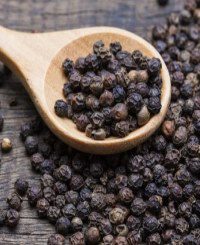Black pepper, often referred to as the “king of spices,” holds a prominent place in kitchens around the world. Its distinct, pungent flavor and aroma make it a staple ingredient in culinary traditions globally. Beyond its culinary prowess, black pepper has enjoyed a rich history in traditional medicine, where it’s valued for its remarkable healing properties. In this exploration, we delve into the multifaceted world of black pepper and unveil its lesser-known role as a health-enhancing spice. We’ll journey through its impressive health benefits of Black pepper, from its antioxidant-rich nature to its anti-inflammatory properties, and its potential to improve brain health, blood sugar control, weight management, and even its role in cancer prevention. Black pepper’s significance extends far beyond the spice rack, offering a treasure trove of well-being advantages that we’re about to uncover.
Table of Contents
Nutritional Composition of Black Pepper

A. Black pepper offers a notable nutritional profile, comprising carbohydrates (37.4%), proteins (25.5%), fibers (23.6%), moisture (4.7%), and fat (5.3%). It is also rich in essential minerals and vitamins, including iron, calcium, phosphorous, vitamins A, C, E, K, niacin, β-carotene, and traces of other nutrients like potassium, magnesium, and zinc. This composition makes black pepper a valuable addition to a diet, contributing to overall nutrition.
B. Piperine, the active compound in black pepper, plays a crucial role in its health benefits. Piperine is a potent antioxidant, which helps prevent or delay the damaging effects of free radicals in the body. It also has anti-inflammatory properties, contributing to reduced inflammation and potential health improvements. Furthermore, piperine is known for its potential to enhance nutrient absorption in the digestive system, making it a valuable component in various herbal and traditional medicines. These combined effects of piperine make black pepper not only a flavorful spice but also a significant contributor to overall well-being.
Health Benefits of Black Pepper
Black pepper has several potential health benefits due to its active components, including piperine, volatile oils, and oleoresins. Here are 20 potential health benefits of black pepper:
- Improves Gastrointestinal Motility: Piperine in black pepper helps improve gastrointestinal motility, promoting better digestion and nutrient absorption.
- Reduces Inflammation: Black pepper contains piperine, a compound with anti-inflammatory properties that can help reduce inflammation in the body.
- Reduces Oxidation: Piperine’s antioxidant properties in black pepper may reduce oxidative stress and free radical damage to cells.
- Reduces Genotoxicity: Some studies suggest that black pepper may have a protective effect against genotoxicity, reducing DNA damage.
- Helps with Asthma: Piperine has been associated with potential relief for asthma by reducing airway inflammation and bronchoconstriction.
- Helps with Diabetes: Black pepper may contribute to better blood sugar control due to its potential to enhance insulin sensitivity and reduce insulin resistance.
- Helps with Hyperlipidemias: Piperine’s antioxidant properties can be beneficial for individuals with hyperlipidemias by reducing lipid peroxidation and improving lipid profiles.
- Helps with Obesity: Black pepper may assist in weight management by enhancing metabolism and promoting fat loss.
- Helps with Metabolic Syndrome: Piperine’s potential to improve insulin sensitivity and reduce inflammation may benefit individuals with metabolic syndrome.
- Increases Bioavailability of Certain Drugs: Piperine has been shown to enhance the bioavailability of various drugs, improving their effectiveness.
- Improves Cognitive Performance: Some studies suggest that piperine may enhance cognitive performance by promoting better nutrient absorption and reducing oxidative stress in the brain [1].
- Improves Hepatic Health: Black pepper’s antioxidant properties can support liver health by reducing oxidative damage to liver cells.
- Helps with Urticaria: Piperine’s anti-inflammatory effects may provide relief from urticaria, a skin condition characterized by hives and itching.
- Helps with Ulcerative Colitis: The anti-inflammatory properties of black pepper may offer relief for individuals with ulcerative colitis, a form of inflammatory bowel disease.
- Brain Health Improvement: Piperine may contribute to better brain health by reducing oxidative stress and inflammation, potentially enhancing cognitive function.
- Blood Sugar Control: Black pepper’s potential to improve insulin sensitivity can assist in better blood sugar control, particularly for individuals with diabetes.
- Potential Cancer-Fighting Properties: Piperine’s antioxidant properties make black pepper a potential candidate for fighting cancer by reducing free radical damage to cells.
- Weight Loss Support: Black pepper’s metabolism-boosting effects can aid in weight loss efforts by promoting fat loss.
- Skin Health Benefits: The antioxidants in black pepper may contribute to healthier skin by reducing oxidative damage and promoting a radiant complexion.
- Respiratory Health Improvement: Piperine may help improve respiratory health by reducing airway inflammation, potentially providing relief for conditions like asthma.
These health benefits make black pepper a valuable addition to both culinary and wellness practices.
Summary
Overall, black pepper has several potential health benefits due to its active components, including piperine, volatile oils, and oleoresins. However, more research is needed to fully understand the mechanisms behind these benefits and their potential applications in clinical settings. It is always best to consult with a healthcare professional before using black pepper or any other natural remedy for health purposes.
See also: Cashew Nuts Benefits for Male Health
Culinary Uses and Recipes
A. Culinary Uses of Black Pepper: Black pepper is a versatile spice commonly used in various culinary applications. It’s a staple seasoning in many cuisines worldwide and is known for its ability to enhance the flavor of dishes. Some common culinary uses include:
- Seasoning for savory dishes like soups, stews, and roasted meats.
- A key ingredient in spice blends, such as curry powder and garam masala.
- A finishing touch on pasta dishes, salads, and scrambled eggs.
- An essential component of marinades and rubs for grilling and barbecuing.
- A flavor enhancer for homemade salad dressings and sauces.
B. Black Pepper-Infused Recipes:
- Black Pepper Crusted Steak:
- Ingredients: Steak, black pepper, salt, olive oil.
- Instructions: Coat the steak with a generous amount of coarsely ground black pepper and salt. Pan-sear in olive oil to your desired doneness.
- Spaghetti Aglio e Olio with Black Pepper:
- Ingredients: Spaghetti, garlic, olive oil, black pepper, red pepper flakes, parsley.
- Instructions: Sauté sliced garlic in olive oil, add cooked spaghetti, and toss with black pepper, red pepper flakes, and fresh parsley.
- Black Pepper Gravy:
- Ingredients: Butter, flour, milk, black pepper, salt.
- Instructions: Make a roux with butter and flour, then add milk, black pepper, and salt. Simmer to create a creamy black pepper gravy, perfect for biscuits or mashed potatoes.
Dosage and Precautions
A. Recommended Dosage and Precautions:
- Black pepper is generally considered safe when used in typical culinary amounts in food and cooking.
- Supplements containing 5-20 mg of black pepper extract are also considered safe for most individuals [1].
- However, if you’re considering using black pepper supplements or extracts for therapeutic purposes, it’s advisable to consult with a healthcare professional to determine the appropriate dosage.
- Precautions:
- Allergic reactions to black pepper are rare but possible, so individuals with known allergies should exercise caution.
- Excessive consumption of black pepper may lead to gastric irritation in some individuals, so moderation is key.
- If you have a medical condition or are taking medications, consult with a healthcare provider before using black pepper supplements or extracts.
Conclusion
Black pepper is not only a versatile and flavorful spice used in a wide range of culinary dishes but also offers a host of potential health benefits, including improved digestion, anti-inflammatory effects, and antioxidant properties. While its culinary uses are well-established and safe, using black pepper in supplement form should be done cautiously and under professional guidance. Its ability to both enhance the taste of your favorite dishes and potentially contribute to your well-being makes it a valuable addition to your kitchen and overall health.





One thought on “20 Amazing Health Benefits of Black Pepper (Kali Mirch) Culinary Uses and Recipes”